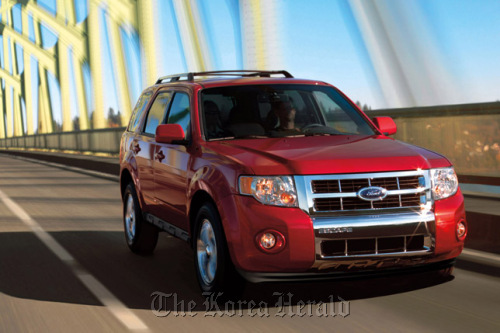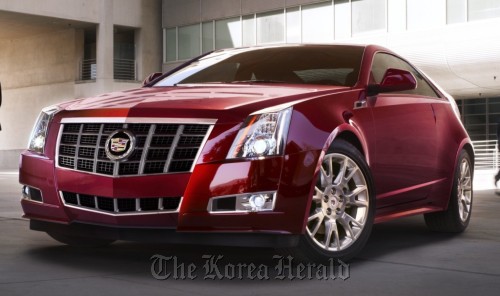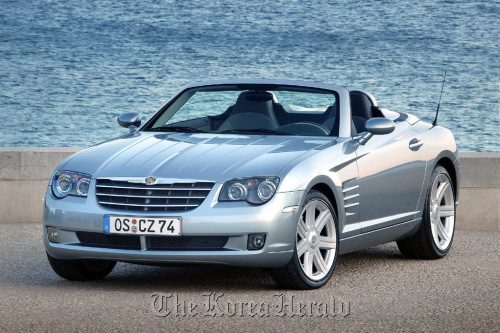GM, Ford, Chrysler seek to attract consumers by lowering price tags
Chrysler was the biggest-selling U.S. auto brand in Korea last month excluding Chevrolet of GM Korea. But Chrysler’s sales ranking among all import brands, including the likes of BMW and Mercedes-Benz, was just eighth.
Further, its February sales of 301 units included Jeep and Dodge vehicles as well as Chrysler sedans. Ford, including the Lincoln brand, ranked 10th with 230 units while Cadillac of General Motors was 18th with 59 units in the same month.
Chrysler was the biggest-selling U.S. auto brand in Korea last month excluding Chevrolet of GM Korea. But Chrysler’s sales ranking among all import brands, including the likes of BMW and Mercedes-Benz, was just eighth.
Further, its February sales of 301 units included Jeep and Dodge vehicles as well as Chrysler sedans. Ford, including the Lincoln brand, ranked 10th with 230 units while Cadillac of General Motors was 18th with 59 units in the same month.

Though GM Korea, which acquired Daewoo Motor in 2001, is capturing nearly 10 percent of the local market with its Chevrolet brand, most of its cars are produced in Korea.
But U.S. automakers’ lackluster performance is expected to change after March 15, when the Korea-U.S. Free Trade Agreement takes effect.
Some think tanks predict that imports from the U.S. will jump to 75,000 units per annum under the FTA, from fewer than 10,000 units currently.
Under the pact, the tariff on U.S.-made cars will be lowered from 8 percent to 4 percent immediately. The 4 percent tariff will be lifted completely in four years.
U.S. automakers are about to engage in aggressive marketing here to take on Hyundai Motor and Kia Motors.
GM recently decided to slash the prices of all Cadillac models a maximum of 3.5 percent, reflecting in advance the tariff cut. GM Korea has opened a large dealership in southern Seoul as part of efforts to attain a double-digit market share.
Cadillac dealers are also expected to make the most of GM Korea’s sales networks and distribution channels nationwide.
Ford Motor plans to open seven more showrooms in the local market and increase the number of dealerships from the current 15 to more than 30 within two or three years.
Earlier this month, the company lowered the price of the Fusion Hybrid by 4.7 million won ($4,200) to 42.9 million won.


Chrysler Group, which has mostly sold large sedans here, is moving to launch small sedans including the Fiat 500 this year.
The group’s three affiliated brands ― Chrysler, Jeep, Dodge ― and Italian brand Fiat, a joint carmaker of the group, plan to diversify models for Korean sales.
Meanwhile, some industry observers say U.S. carmakers should improve the relatively low fuel efficiency of their vehicles if they seek to maximize the benefits of the FTA.
It is still uncertain if the American brands will bite into sales of German brands that are gaining popularity despite price tags that remain high even with the Korea-EU FTA, which went into effect last July.
Apart from GM, Ford and Chrysler, a growing number of Japanese cars produced in the U.S. will likely be imported under the coming slash in tariffs.
Toyota Korea will introduce about 6,000 units of the new Camry sedan produced in the U.S.
The midsize sedan is expected to provide competition for Hyundai Motor’s Sonata and Kia Motor’s K5.
Nissan, which attracted a great number of Korean customers by launching the Cube last year, will also import several new models from its American factories.
The second-largest automaker in Japan has set a goal of making the Infiniti series one of the top three import brands in the premium luxury segment.
U.S. carmakers have long expressed unease about the trade imbalance between the two countries in the automobile industry.
Korea ships more than 400,000 vehicles made by Hyundai Motor and Kia Motors to the U.S. each year, and produces about 200,000 others at local plants. The U.S. exports fewer than 10,000 cars to Korea.
Several weeks ago, U.S. President Barack Obama, who is seeking to garner wide support from automotive industry employees in his re-election campaign, said the U.S. would soon be able to sell more cars to Korea.
“Thanks to the bipartisan trade agreements I signed into law with you in mind, there will soon be new cars on the streets of South Korea imported from Detroit, Toledo and Chicago,” Obama said.
The bilateral pact between the two countries was initially signed in 2007 but endorsed by each legislative body in 2011 after the two sides held several renegotiations.
Meanwhile, Korea’s opposition lawmakers claim that the auto-related terms have been revised to give unfair advantage to U.S. manufacturers.
Unlike the immediate slash of the 8 percent tariff on U.S. cars to 4 percent, the 2.5-percent tariff on made-in-Korea cars exported to the U.S. will be kept untouched for five years.
Further, the 25 percent tariff on made-in-Korea sport utility vehicles and pickup trucks will be kept over the next seven years in the U.S. market.
By Kim Yon-se (kys@heraldcorp.com)







![[Graphic News] More Koreans say they plan long-distance trips this year](http://res.heraldm.com/phpwas/restmb_idxmake.php?idx=644&simg=/content/image/2024/04/17/20240417050828_0.gif&u=)
![[KH Explains] Hyundai's full hybrid edge to pay off amid slow transition to pure EVs](http://res.heraldm.com/phpwas/restmb_idxmake.php?idx=644&simg=/content/image/2024/04/18/20240418050645_0.jpg&u=20240419100350)





![[From the Scene] Monks, Buddhists hail return of remains of Buddhas](http://res.heraldm.com/phpwas/restmb_idxmake.php?idx=652&simg=/content/image/2024/04/19/20240419050617_0.jpg&u=20240419175937)

![[KH Explains] Hyundai's full hybrid edge to pay off amid slow transition to pure EVs](http://res.heraldm.com/phpwas/restmb_idxmake.php?idx=652&simg=/content/image/2024/04/18/20240418050645_0.jpg&u=20240419100350)

![[Today’s K-pop] Illit drops debut single remix](http://res.heraldm.com/phpwas/restmb_idxmake.php?idx=642&simg=/content/image/2024/04/19/20240419050612_0.jpg&u=)